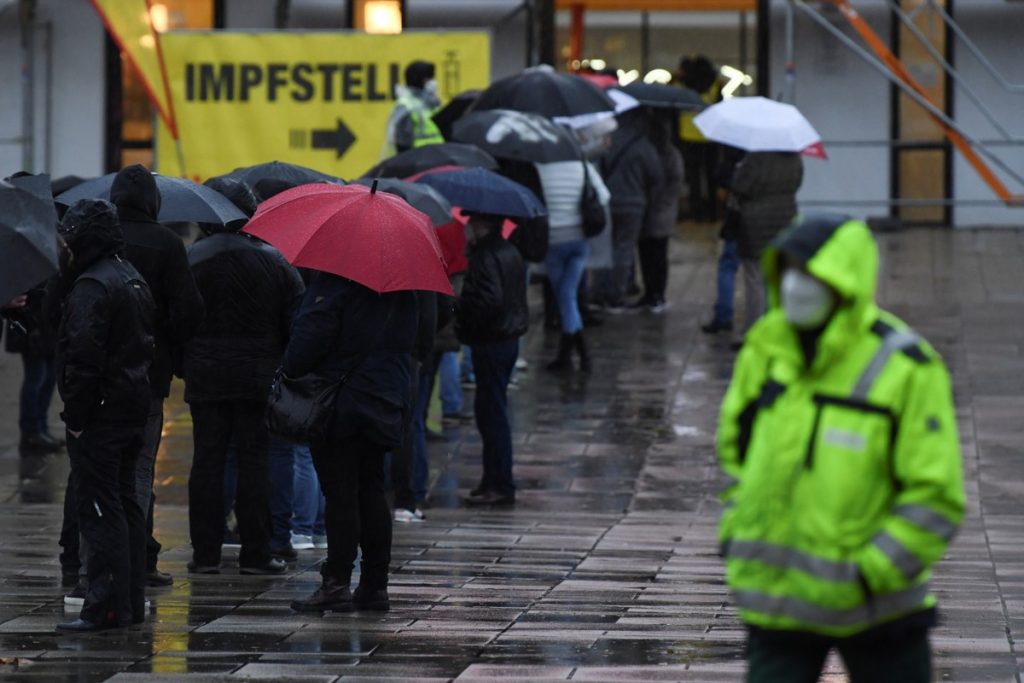a Germany Registered this Saturday (15) new Record the incidence of Covid-19 in seven days: 497.1 infections per 100,000 population. Despite the large number, the spread of the omicron variant of the coronavirus still does not affect intensive care units (ICUs) widely, according to doctors. This is likely due to the large number of young people affected.
.’s previous record The infection rate was 485.1 new infections per 100,000 populationOn November 29, 2021. The infection rate on Saturday last week was 335.9.
According to the Robert Koch Institute (RKI), the government agency for disease control and prevention, 78,022 new cases of coronavirus were recorded on Saturday – down from a record of 92,223 cases on Friday.
a Germany adoption Large-scale testing policyThis is the reason why so many cases are reported compared to other countries. In many cities, residents can take up to one antigen test per day for free.
In addition, the 2G plus rule has been in effect since Monday. This means that people who have been vaccinated with only two doses and with a recent negative test can get to cafes and restaurants, for example. People who have already received the booster medication are exempt from the test.
There is no overcrowding in the intensive care units
However, large numbers of cases have not appeared in intensive care units. “Currently, we cannot identify an omicron wave in intensive care units,” said Gernot Marx, head of the Intensive Care Registry, the German Multidisciplinary Society for Intensive Care and Emergency Medicine (Divi, its acronym in German).
“Fortunately, when it comes to Covid-19 patients [em UTIs], we can continue to report decreasing numbers,” Marks highlights.
On Thursday, intensive care unit admissions for Covid-19 fell below the 3,000-patient mark directly for the first time since mid-November.
Out of 25,171 beds in the intensive care unit Germany, 2,872 patients infected with Covid-19, 1,741 of whom are on mechanical ventilation. Another 18,307 beds are occupied by people with other diseases, and 3,992 beds are available.
As of Friday, the hospitalization rate for those infected with the virus was 3.23 per 100,000 people in the past seven days.
Marks emphasized that people under the age of 35 currently develop oomicrons.
“These develop an acute course of the disease much less often than the elderly, so they are not yet, or are only occasionally, sick in our intensive care units,” he explained.
Severe cases less than delta
According to Marks, it is expected that, compared to a delta-variable wave, in which about 0.8% of all sufferers were treated in intensive care, far fewer patients who test positive with such a course will have serious illness.
“If accidents rise sharply due to the spread being so rapid, this could still be a problem,” Marks pondered.
Opinion of Critical Care Physician Christian Karaganidis of Davy. “The situation in ordinary wards in Germany It could become especially dramatic if the number of cases continues to rise.”
Expert Clemens Wendtner warned that a fourth dose of the Covid-19 vaccine must be planned quickly. “For me, a fourth vaccination four to six months after the third dose would be an appropriate procedure,” said the head of the infectious disease department at the Schwabing Clinic in Munich.
At the same time, he stressed that due to the lack of data, there is still no recommendation from the Standing Committee on Vaccination for a second booster. Many argue that one should wait for vaccines adapted to protect against the micron. “But I’m afraid it’s going to take a long time,” Wendtner said.
No new vaccines should be expected before April.
employment Germany, 71.84% of people have already received two doses of the Covid-19 vaccine and 45.48% a booster dose, according to the Our World in Data platform, from the University of Oxford.
Experts see the high rate of vaccinations as a cause for concern. Tobias Kurth, an epidemiologist at Berlin’s Charité, told DW he expects the rise in infections will put pressure on health facilities.
“This number is expected to continue to rise, with infection rates likely to rise above 1,000 [ a cada 100.000 habitantes]”, He said.
“With so many people still not vaccinated, there is still a high chance that they will unfortunately end up in hospital. For the health care system, the situation is still very worrying,” Kurtus told DW.
Cases of forgery of vaccination passports
In almost all German states, the number of forgery of vaccination passports is increasing. According to a survey conducted by the EPD news agency between ministries, state criminal investigation offices and law enforcement authorities, the number of cases has risen sharply since the end of the year.
Cases in Bavaria jumped from 340 in October 2021 to more than 1,900 in December. In North Rhine-Westphalia, the number also rose steadily to more than 1,200 cases in December.
There are believed to be at least 20,000 cases of this crime across the country. However, this number could be much higher, as the actual size of the total number of fake vaccination cards in circulation cannot be reliably determined, Berlin police said.
To try to contain the spread of the coronavirus, from Saturday, restrictions will be applied to night outings for unvaccinated people in Baden-Württemberg. The rules apply between 9 p.m. and 5 a.m. to the unvaccinated and those who have not recovered from the disease. There are exceptions if there are valid reasons.

“Gamers. Unfortunate Twitter teachers. Zombie pioneers. Internet fans. Hardcore thinkers.”

:strip_icc()/i.s3.glbimg.com/v1/AUTH_59edd422c0c84a879bd37670ae4f538a/internal_photos/bs/2024/f/t/6buA8UQpywNnqYnl19SA/mireya.jpg)


:strip_icc()/i.s3.glbimg.com/v1/AUTH_59edd422c0c84a879bd37670ae4f538a/internal_photos/bs/2024/g/y/4q3SqCTRmArq2ahiCzeA/captura-de-tela-2024-07-23-002103.png)


More Stories
White Noise: People who make money recording sounds like rain and washing machine
Bolsonaro summons foreign ambassadors to speak out against electronic voting machines on Monday
Understanding why the appearance of a giant paddlefish causes fear in Chileans (video)